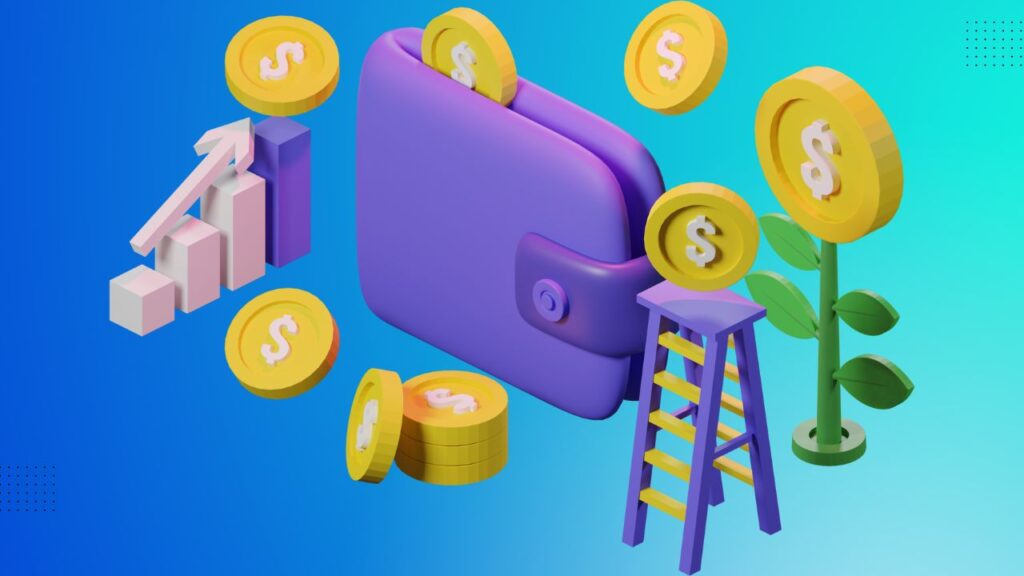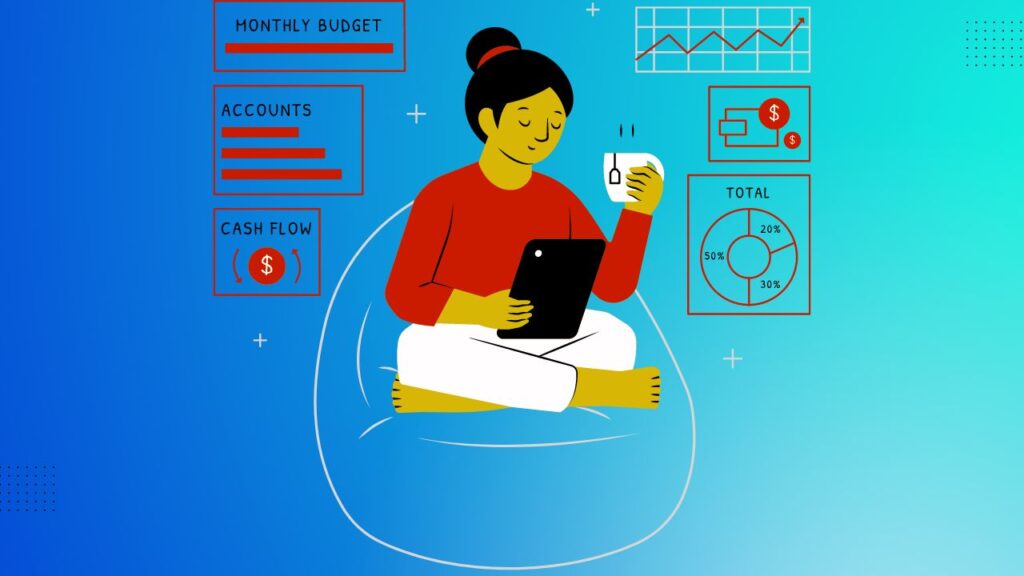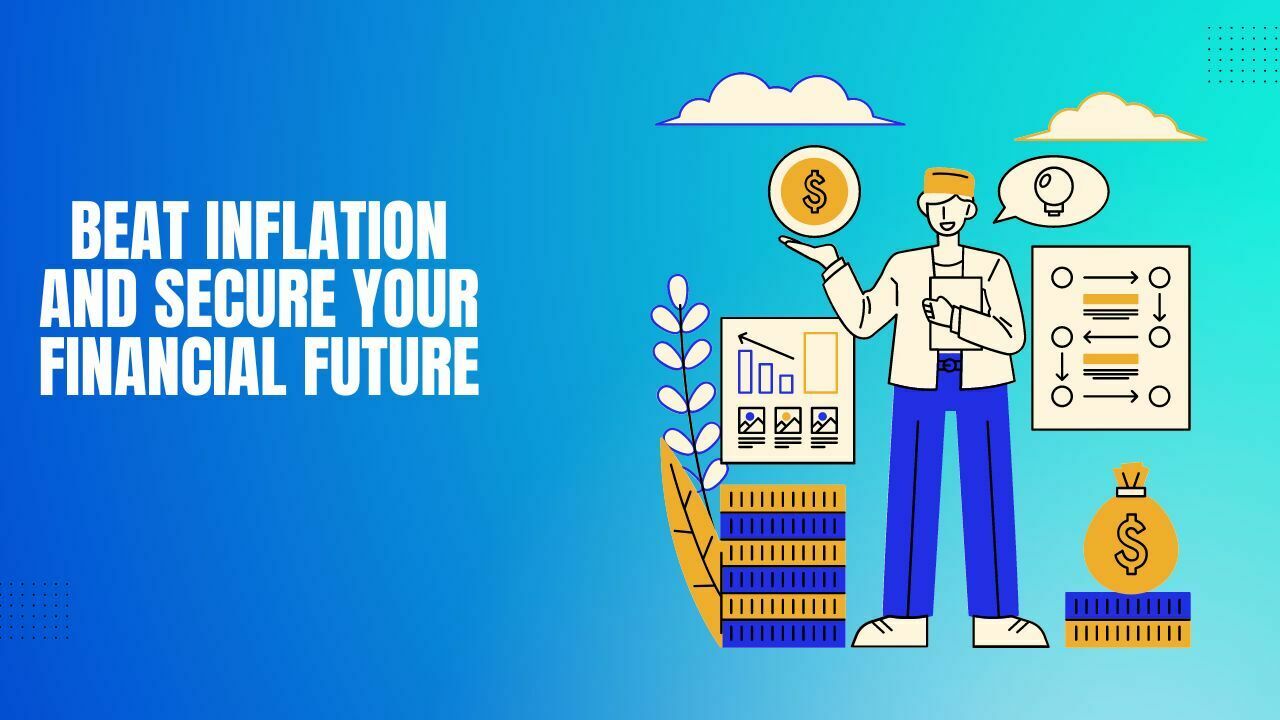Let’s talk about a topic that’s not always on our minds but is incredibly important for our financial futures: inflation.
You may have heard the term before, but do you know what it means for your money?
Inflation is the gradual increase in the prices of goods and services over time, which means that the value of your money decreases as time goes on.
For example, $1 today won’t have the same purchasing power in a few years.
So why should you care about inflation?
Well, research shows that inflation rates have been on the rise in recent years, which can have a significant impact on our financial well-being.
In fact, according to the Bureau of Labor Statistics, the Consumer Price Index (CPI) rose by 6.4% in 2022 compared to the previous year.
But don’t worry, there are ways to beat inflation and secure your financial future.
In this article, we’ll explore strategies for investing, saving, earning more, and budgeting to beat inflation.
These tips are specifically tailored to our millennial audience who are looking to build a solid financial foundation for the long term.
So if you want to learn how to beat inflation and secure your financial future, keep reading!
1. Understanding Inflation

Inflation is the gradual increase in the prices of goods and services over time, resulting in a decrease in the purchasing power of money.
In other words, the same amount of money can buy less over time due to the rising cost of goods and services.
1.1 Causes of inflation
There are various causes of inflation, including:
- Increase in demand: When the demand for goods and services exceeds the supply, prices tend to rise.
- Increase in production costs: When the cost of producing goods and services increases, companies may raise prices to maintain their profit margins.
- Government policies: Policies such as printing more money, reducing interest rates, or increasing government spending can cause inflation.
- External factors: Events such as natural disasters, war, or changes in international trade can affect the prices of goods and services.
1.2 Historical Inflation Rates and Trends
Inflation rates have varied throughout history and across countries.
Here are some examples of historical inflation rates in the United States:
- In the 1970s, inflation rates in the U.S. were at an all-time high, with an average annual rate of 7.1% from 1970 to 1979.
- In the 1980s, the U.S. government implemented policies to combat inflation, resulting in lower inflation rates. The average annual inflation rate during this period was 4.1%.
- In recent years, inflation rates in the U.S. have been relatively low. The average annual inflation rate from 2011 to 2020 was 1.7%.
1.3 Impact of Inflation on Personal Finances
Inflation can have a significant impact on personal finances, including:
- Reduced purchasing power: As the cost of goods and services rises, the same amount of money can buy less, reducing the purchasing power of money over time.
- Reduced savings: If the interest rate on savings accounts is lower than the inflation rate, savings can lose value over time.
- Increased debt: Inflation can cause the cost of borrowing money to increase, leading to higher interest rates on loans and credit cards.
- Reduced investment returns: Inflation can erode the returns on investments, particularly if the investment does not keep pace with inflation.
To summarize, understanding inflation is crucial for millennials who want to beat inflation and secure their financial future.
By staying informed about inflation rates and causes, we can make informed decisions about investing, saving, and spending.
2. Investing to Beat Inflation

Investing is one of the most effective ways to beat inflation and secure your financial future.
By investing in assets that can keep pace with or exceed inflation, you can maintain and grow your wealth over time.
While investing always carries some degree of risk, it is essential to take a long-term view and understand that inflation can erode the value of cash over time.
2.1 Types of Investments that can help beat inflation
2.1.1 Stocks
Historically, stocks have been one of the best-performing asset classes over the long term, with average annual returns of around 10%.
Investing in stocks can help beat inflation as companies can raise prices to keep pace with inflation, leading to increased profits and higher stock prices.
However, investing in stocks comes with risk and volatility, so it is important to diversify your portfolio and invest in a mix of stocks across different sectors.
2.1.2 Real Estate
Real estate is another investment that can help beat inflation.
Over the long term, real estate tends to appreciate, and rental income can provide a steady source of cash flow.
Real estate can also be a hedge against inflation as rents can be increased to keep pace with inflation.
However, investing in real estate requires a significant upfront investment and ongoing maintenance costs.
2.1.3 Gold and other precious metals
Gold and other precious metals have long been considered a safe haven for investors during times of economic uncertainty.
Precious metals can help beat inflation as their value tends to rise when inflation is high.
However, investing in precious metals comes with costs such as storage and insurance fees, and the price of these metals can be volatile.
2.1.4 Treasury Inflation-Protected Securities (TIPS)
TIPS are bonds issued by the U.S. government that are indexed to inflation.
The principal value of TIPS adjusts with inflation, providing investors with a hedge against inflation.
TIPS pay interest twice a year based on a fixed rate plus the inflation rate, making them an attractive investment for those seeking a safe and steady income stream.
However, TIPS come with lower returns than stocks and other investments and may not provide enough return to beat inflation in some years.
To conclude, investing in assets that can keep pace with or exceed inflation is essential for millennials who want to beat inflation and secure their financial futures.
By diversifying their investment portfolios across a mix of asset classes, millennials can minimize risk and maximize returns over the long term.
It’s important to remember that investing always carries some degree of risk and that past performance is not a guarantee of future results.
It’s always wise to consult with a financial advisor before making any investment decisions.
2.2 Strategies for Investing to Beat Inflation
Here are some strategies for investing to beat inflation:
2.2.1 Diversification
Diversification is a key strategy for managing risk in your investment portfolio.
By diversifying your investments across different asset classes, such as stocks, bonds, real estate, and commodities, you can minimize your exposure to any one type of investment and reduce the impact of market volatility on your portfolio.
Diversification can also help you capture returns from different areas of the market and maximize your overall returns over the long term.
2.2.2 Long-term investing
Investing for the long term is another important strategy for beating inflation.
While short-term market fluctuations can be unsettling, a long-term investment horizon can help smooth out the impact of market volatility on your portfolio.
By investing for the long term, you can also take advantage of the power of compounding returns, which can significantly boost your investment returns over time.
2.2.3 Investing in growth stocks
Growth stocks are stocks of companies that are expected to grow at a faster rate than the market.
These companies typically reinvest their earnings back into the business to fuel growth, which can lead to higher stock prices over time.
Investing in growth stocks can help beat inflation as these companies can raise prices to keep pace with inflation, leading to increased profits and higher stock prices.
However, investing in growth stocks comes with risk and volatility, so it’s important to do your research and invest in a mix of growth stocks across different sectors.
2.2.4 Investing in high-yield bonds
High-yield bonds, also known as junk bonds, are bonds issued by companies with lower credit ratings than investment-grade bonds.
These bonds typically offer higher yields than investment-grade bonds to compensate investors for the increased credit risk.
Investing in high-yield bonds can help beat inflation as the higher yields can provide a hedge against inflation.
However, high-yield bonds also come with higher risk and default rates than investment-grade bonds, so it’s important to do your research and invest in a diversified portfolio of high-yield bonds.
2.2.5 Real estate investing
Real estate investing can also be a strategy for beating inflation.
As mentioned earlier, real estate tends to appreciate over the long term, and rental income can provide a steady source of cash flow.
Real estate can also be a hedge against inflation as rents can be increased to keep pace with inflation.
However, investing in real estate requires a significant upfront investment and ongoing maintenance costs.
It’s important to do your research and invest in a mix of residential and commercial real estate properties across different locations to minimize risk.
In conclusion, investing in a mix of diversified assets, investing for the long term, and investing in growth stocks, high-yield bonds, and real estate can help millennials beat inflation and secure their financial futures.
However, it’s important to remember that investing always carries some degree of risk and that past performance is not a guarantee of future results.
It’s always wise to consult with a financial advisor before making any investment decisions.
3. Saving to Beat Inflation

Saving money is an important part of building financial security, especially in the face of inflation.
Saving can help you maintain your purchasing power and offset the impact of rising prices.
Without saving, inflation can erode the value of your money and impact your long-term financial goals.
3.1 Strategies for Saving to Beat Inflation
Here are some strategies for saving money to beat inflation:
3.1.1 High-yield savings accounts
High-yield savings accounts offer higher interest rates than traditional savings accounts, allowing you to earn more on your savings.
These accounts are FDIC-insured and often have no minimum balance requirements.
3.1.2 Certificates of Deposit (CDs)
CDs offer a fixed interest rate for a set period, which can be a good option for those who don’t need immediate access to their savings.
CDs generally offer higher interest rates than savings accounts but may require a minimum deposit and charge a penalty for early withdrawal.
3.1.3 Money market accounts
Money market accounts are similar to savings accounts but may offer higher interest rates and have check-writing capabilities.
These accounts are also FDIC-insured.
3.1.4 High-yield checking accounts
High-yield checking accounts offer high-interest rates and often have no monthly fees, but may require certain qualifications like a minimum number of debit card transactions each month.
3.2 Tips for maximizing savings to beat inflation
To make the most of your savings and beat inflation, consider these tips:
- Start saving early and regularly
- Keep an eye on fees and expenses
- Automate your savings to make it easier to save consistently
- Consider using a combination of savings strategies to diversify your savings portfolio
- Re-evaluate your savings strategy periodically to make sure it aligns with your financial goals and current economic conditions.
By using these strategies and tips, you can save money and beat inflation, helping to secure your financial future.
4. Earning More to Beat Inflation

Beating inflation is not just about saving and investing; it’s also about earning more.
Inflation can erode your purchasing power over time, and if you’re not earning enough to keep up with inflation, you may find yourself falling behind financially.
Earning more allows you to stay ahead of inflation, build wealth, and secure your financial future.
4.1 Strategies for Earning More to Beat Inflation
4.1.1 Starting a Side Hustle
One way to earn more money is to start a side hustle.
A side hustle is a part-time business or gig that you do in addition to your full-time job.
It can be anything from selling goods online to freelancing your skills.
Starting a side hustle can not only bring in extra income but also help you diversify your income streams.
4.1.2 Investing in Education and Skills Development
Investing in education and skills development can also help you earn more money.
The more skills you have, the more valuable you are to employers or clients.
You can take courses, attend workshops, or even pursue a degree to enhance your skills and knowledge.
4.1.3 Negotiating for a Raise or Promotion
Negotiating for a raise or promotion is another way to earn more money.
If you feel you’re not being compensated fairly for your work or you’ve taken on additional responsibilities, it’s time to ask for a raise or promotion.
Research the market rates for your position, make a list of your accomplishments and contributions, and be prepared to make a strong case for why you deserve a raise or promotion.
4.2 Tips for Maximizing Earnings to Beat Inflation
4.2.1 Focus on High-Paying Industries or Jobs
Certain industries or jobs offer higher salaries than others.
For example, jobs in technology, finance, or healthcare tend to pay more than jobs in retail or hospitality.
Consider focusing your career path on high-paying industries or jobs to maximize your earning potential.
4.2.2 Build a Strong Personal Brand
Building a strong personal brand can also help you earn more money.
Your personal brand is what sets you apart from others in your field and showcases your unique skills and expertise.
It can lead to more job opportunities, higher rates for your services, and increased visibility in your industry.
4.2.3 Network and Build Relationships
Networking and building relationships can also help you earn more money.
Attend industry events, join professional associations, and connect with other professionals in your field.
These relationships can lead to job opportunities, referrals, and other ways to earn more money.
In conclusion, earning more is an important aspect of beating inflation and securing your financial future.
By starting a side hustle, investing in education and skills development, negotiating for a raise or promotion, and focusing on high-paying industries or jobs, you can increase your earning potential and stay ahead of inflation.
5. Budgeting to Beat Inflation

Budgeting is a crucial step in securing your financial future, especially in times of inflation.
It helps you track your spending, control your expenses, and allocate your resources in a way that maximizes your financial growth.
With a well-planned budget, you can beat inflation by ensuring that you have enough money to cover your expenses and invest in opportunities that generate a high return on investment.
5.1 Strategies for Budgeting to Beat Inflation
5.1.1 Cutting Unnecessary Expenses
One way to beat inflation is to cut down on expenses that are not necessary.
Identify areas where you can cut back and allocate the extra funds to your investments.
For instance, you can reduce your dining out expenses or switch to a cheaper cable or internet plan.
The money saved can be used to invest in stocks or other investment opportunities that generate high returns.
5.1.2 Living Below Your Means
Living below your means is another way to beat inflation.
This means spending less than you earn and avoiding debt.
You can achieve this by tracking your spending, creating a realistic budget, and sticking to it.
By living below your means, you can have more money to save and invest in assets that appreciate over time.
5.1.3 Planning for Inflation in Budgeting
When creating a budget, it’s important to factor in inflation.
This means anticipating price increases and adjusting your budget accordingly.
For example, if you spend $200 on groceries per month, you should plan to spend $220 to $240 in a year’s time to account for inflation.
By planning for inflation, you can ensure that you have enough money to cover your expenses in the future.
5.2 Tips for Maximizing Budgeting to Beat Inflation
5.2.1 Use Budgeting Tools and Apps
There are numerous budgeting tools and apps that can help you track your spending, create a budget, and monitor your progress.
Examples include Mint, Personal Capital, and YNAB. These tools can help you stay organized and on top of your finances, making it easier to beat inflation.
5.2.2 Automate Your Savings
Another way to maximize your budgeting efforts is to automate your savings.
This means setting up automatic transfers from your checking account to your savings or investment accounts.
By automating your savings, you can ensure that you are consistently putting money towards your financial goals, even during times of inflation.
5.2.3 Regularly Review and Adjust Your Budget
Finally, it’s important to regularly review and adjust your budget to ensure that it is aligned with your financial goals.
This means tracking your spending, evaluating your progress, and making adjustments as necessary.
By staying on top of your budget, you can maximize your efforts to beat inflation and secure your financial future.
Bottom Line…
By now, you should have a good understanding of what inflation is, its causes, and its effects on your personal finances.
We have also touched upon various strategies and tips on how to beat inflation through investing, saving, earning more, and budgeting.
Remember that beating inflation is not a one-time event but a continuous process that requires discipline, patience, and long-term planning.
It may not be easy, but with the right mindset and tools, you can achieve financial security and independence, regardless of the economic conditions.
Always keep in mind that inflation can erode the purchasing power of your savings and investments, but it can also present opportunities for growth and wealth creation.
By staying informed, diversifying your portfolio, and focusing on your long-term goals, you can beat inflation and enjoy the benefits of a secure financial future.
So start taking action today and apply the knowledge and insights you’ve gained from this guide. Remember, your financial future is in your hands.
